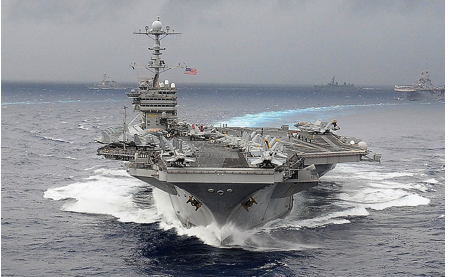The reaction of China’s state-controlled media to the carrier’s deployment caught Washington off-guard, when a number of editorials, statements and articles were issued in quick succession by the state-controlled media and the Chinese Ministry of Foreign Affairs. Most called the deployment provocative, with a comparison to the Cuban Missile Crisis and a claim by a Chinese defence analyst that the carrier would be targeted by Chinese weapons systems.
China’s reaction is informed by its fear of a having a major US military asset within 500 kilometres of Beijing, and its memory of helplessness during the Taiwan crisis of 1995-6. Nonetheless, its reaction challenged international legal norms, as the proposed area for the exercises was in international waters.
China did not legally challenge the exercises, but its actions suggest it seeks a de facto extension of territorial waters. If this is the case, is there a wider trend? In early July, Chinese officials told visiting American counter-parts that the South China Sea, a vital shipping lane for Taiwan, South Korea and Japan, was part of its ‘core interests’. This marked a dramatic shift in Asian Pacific security affairs, placing the body of water in the same category as Tibet and Taiwan for China.
International legal norms are never clear, but a form of ‘creeping sovereignty’ is taking place. The issue is a vital one for all states who take part in maritime trade and deserves a rigorous and thorough examination by a body such as the International Tribunal for the Law of the Sea (ITLOS). As always, the problem would be to get the states involved, and China to agree to arbitrate.
Returning to the Cheonan, China’s reaction to the Yellow Sea exercises ignores the fact that a North Korean vessel deliberately sunk a South Korean vessel. China and Russia continue to cast doubt on its findings, but a multinational investigation team comprising experts from Sweden, the United Kingdom, Australia, the US, and South Korea found North Korea culpable and issued a public report with those findings.
The sinking was a casus belli, yet North Korea has not been punished for the act. Capitalising on the atmosphere of doubt it has created on the issue, China has managed to obfuscate US and South Korean efforts to punish North Korea diplomatically in the UN Security Council, resulting in a harmless Presidential Statement condemning the attack.
Chinese policy is damaging to US interests in the region in two ways. First, it encourages further North Korean aggression. If Pyongyang knows is able to carry out pin-prick attacks without serious repercussions, it may carry out more of this nature. Given North Korea’s nuclear status, it is uncertain what response the US or South Korea could take, short of war-like responses. Secondly, by protecting Pyongyang from such responses, China is testing the security umbrella extended by the US over its regional allies. Any inability of the US to protect its allies would undermine regional security arrangements and destabilise the region.
The Cheonan incident brings into sharp relief the growth of Chinese military power in the region and raises questions over how China will interpret international legal norms and act within existing regional security arrangements. For the last 60 years, the US-led security arrangements in the Asia Pacific region have worked well; indeed, to some extent the Asian miracle was built on security guarantees which ensured the freedom of the seas and enabled states to concentrate on economic growth. Unlike NATO, these arrangements are a loose patchwork of bilateral alliances between Washington and regional capitals. These have been has sufficient up until now, but it is unclear is they will continue to be enough.
John Hemmings is Studies Coordinator and Research Analyst, Royal United Services Institute for Defence and Security Studies (RUSI), London.

